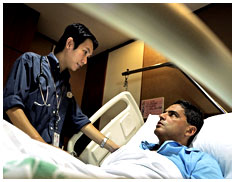Good Clinical Practice (GCP) Training For Principal Investigators of Clinical Trials
It is essential that Principal Investigators and Site Principal Investigators of clinical trials receive Good Clinical Practice (GCP) training prior to the initiation of a clinical trial as they are responsible for ensuring the proper conduct of the clinical trial and safety of the subjects by adhering to the relevant local regulations and guidelines.
Frequently Asked Questions
1. What is the GCP Course?
2. Who should complete the GCP Course?
3. Is the completion of GCP training considered a minimum training for Population Health Research (Submission to DSRB Domain F)?
4. What are the other accepted GCP Courses?
5. I’ve conducted multiple clinical trials; can I apply for a waiver of GCP training?
6. Do I still need to complete the Financial Conflict of Interest (FCOI) Training Requirements?
7. How do I update my GCP Training Status?
1. What is the GCP Course?
Based on the International Council for Harmonisation Guideline for Good Clinical Practice (ICH GCP) E6(R2) and incorporating local regulatory requirements, the GCP course seeks to equip participants with basic knowledge and understanding of how GCP principles may be applied to the conduct of clinical trials. Experienced speakers from various clinical research-related sectors will deliver a series of lectures covering the following broad elements:
• Core principles of Good Clinical Practice and ethical research;
• Local regulatory requirements and legal framework for clinical trials;
• Responsibilities of the sponsor and investigator;
• Procedures related to the operationalisation and conduct of clinical trials.
The GCP course is administered by the NHG Research and Development Office, and is available in both online and classroom formats.
2. Who should complete the GCP Course?
With effect from 1st August 2014, Principal Investigators and Site Principal Investigators who will be conducting new Clinical Trial studies will have to complete GCP Course regardless of whether they have completed the CITI Program.
Principal Investigators and Site Principal Investigators will need to produce proof of attendance or completion by uploading a copy of the certificate on their ROAM profile.
3. Is the completion of GCP training considered a minimum training for Population Health Research (Submission to DSRB Domain F)?
Investigators who are conducting population health research may not substitute completion of GCP Course for the CITI Program. This is because the contents covered in the GCP Course focuses on clinical trials involving medicinal/therapeutic products or devices, which are not relevant to the population health research.
4. What are the other accepted GCP Courses?
Other GCP courses which are recognised by DSRB include:
- Good Clinical Practice course, jointly conducted by SingHealth Investigational Medicine Unit and SingHealth Academy
If you have attended a GCP course conducted by an organisation that is not listed above, you may email a copy of the completion certificate and course agenda with the speakers’ designations to min_ethics_training@nhg.com.sg for consideration. Requests for recognition of other GCP courses will be reviewed on a case-by-case basis.
Note: Only courses that cover Singapore’s regulatory requirements and legal framework for clinical trials are likely to meet the criteria for recognition, and should be submitted for review.
5. I’ve conducted multiple clinical trials; can I apply for a waiver of GCP Course?
Experienced Investigators who have assumed the roles and responsibilities of a Principal Investigator for multiple clinical trials may apply for a waiver of the additional requirement provided the following conditions are met:
(a) The applicant must have conducted a minimum of five clinical trial studies, either as a Principal Investigator or Site Principal Investigator, within NHG or its partner institutions under the oversight of DSRB over the last six years.
(b) The applicant must have enrolled at least one subject for these clinical trials.
(c) The applicant certifies that there were no major research ethics violation or non-compliance, unjustified DSRB SOP deviation, RCR citation and complaints for these clinical trials (completed and on-going).
You may complete the Request Form for the Waiver of GCP Training and email a copy of the waiver form to min_ethics_training@nhg.com.sg. If these clinical trial studies were not submitted through ROAM, you should submit your CV and the approved protocol(s) together with the request form. The submitted request form and supporting documents will be reviewed by the NHG Research Ethics Committee and applicants will be notified of the outcome.
Please note that approval for the wavier of GCP certification does not exempt investigators and study team members from taking the FCOI course.
Click here to download the GCP Minimum Training Requirement Waiver Form.
6. Do I still need to complete the Financial Conflict of Interest (FCOI) Training Requirements?
Yes. With effect from 1st January 2015, all investigators and study team members who are involved in the design, conduct or reporting of the research in institutions under the oversight of the NHG DSRB are required to complete the FCOI Course.
7. How do I update GCP Training Status?
When you have completed the GCP Course, you will need to upload a copy of the completion certificate onto your ROAM profile under 'Personal Info' -> 'Researcher Minimum Training Status' section. Please select the appropriate Training Category i.e. 'GCP'.
A single file upload is preferred. However, if you have multiple files, please upload as separate documents. Please note that zipped files will not be allowed due to security reasons.
Upon receipt and verification, the Administrator will update your Minimum Training Status in your ROAM profile to "Completed". Please allow some time for processing.
Please note that whenever you re-upload a document onto your ROAM profile, the Minimum Training Status will revert to "Not Completed" until the uploaded document is verified.
You can refer to the User Guide here.
List of Available Guides, Forms and Useful Links
- Click here to download the Waiver of Completion of ICH-GCP Certification Form.
